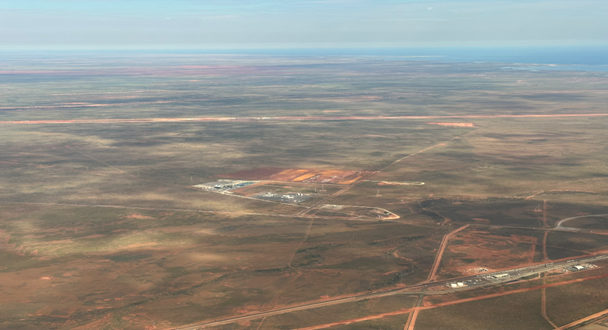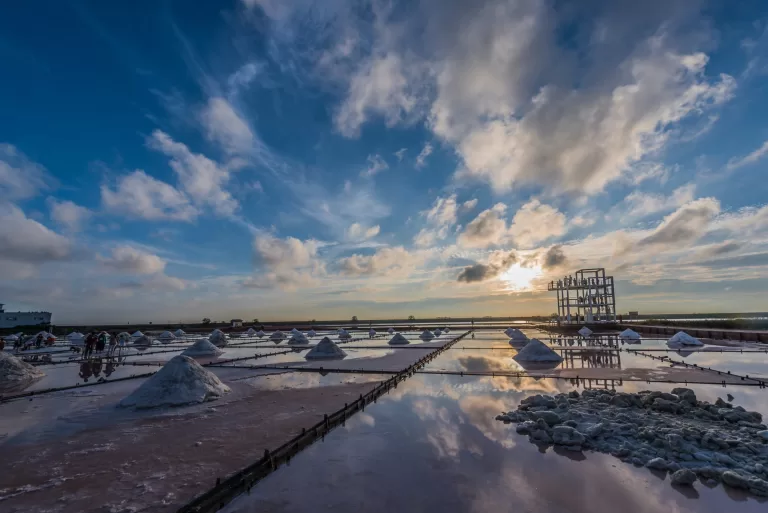Alkemy Capital Investments plc (LON:ALK) and its wholly-owned Australian subsidiary Port Hedland Lithium Pty Ltd has announced the completion of a Feasibility Study for Australia’s first stand-alone lithium sulphate processing facility, located at the Boodarie Strategic Industrial Area, just outside of Port Hedland, Australia’s largest export port.
The Feasibility Study has been produced ahead of schedule in response to the due diligence requirements of certain global OEMs looking to utilise and contract with Alkemy’s refineries.
HIGHLIGHTS:
· Class 4 Feasibility Study completed by Wave International for Australia’s first stand-alone lithium sulphate processing facility at the Boodarie SIA, Port Hedland
· The Boodarie refinery has been designed to process spodumene concentrate from various potential Australian mines, producing a lithium sulphate monohydrate (LSM) for TVL’s Wilton refinery in the UK
· Initial capital cost for Train 1 of US$322 million
· Gross revenues per annum for Train 1 of US$396 million
· Internal rate of return (IRR) of 18%
· Post-tax net present value (NPV) for Train 1 of $293 million
· NPV for 4 Trains of US$1.0 billion, which combined with Wilton’s NPV of US$2.7 billion gives a total NPV of US$3.7 billion across both projects when all 4 Trains are built
· Flora and Fauna baseline survey completed for Boodarie as part of the required environmental approvals
Alkemy’s strategy, through its two wholly-owned subsidiaries, PHL and Tees Valley Lithium Ltd (“TVL”), is to produce a high value, low carbon intermediate lithium sulphate product in Australia for onward processing in the UK into a premium battery grade product, for sale to Tier 1 customers in the fast growing premium European market.
PHL is developing a stand-alone merchant lithium sulphate refinery at the Boodarie SIA located just south of the proposed new Lumsden Point Critical Minerals Wharf in Port Hedland, the world’s largest export port by volume, with established road and rail infrastructure connections to Western Australia’s world-class hard-rock lithium resources.
Powered by local renewable energy, each of the four proposed lithium sulphate trains at Boodarie will refine approximately 180,000 tpa of locally mined spodumene concentrate to produce 40,000 tpa of lithium sulphate, with lithium content equivalent to 24,000 tpa lithium hydroxide. It is anticipated that lithium sulphate produced by PHL will be processed further by TVL before sale to end customers, although PHL will retain flexibility to provide lithium sulphate to third parties should demand arise.
Conducting the first part of the refining process in Australia minimises the quantity of waste material exported and reduces both the shipping cost and the embedded carbon of the resulting lithium products.
At Wilton, in the Teesside Freeport in the north-east of the UK, TVL is establishing Europe’s largest low-carbon merchant lithium hydroxide refinery. Each of the four trains at Wilton will take feedstock in the form of lithium sulphate or crude carbonate, to produce 24,000 tpa of battery-grade lithium hydroxide (or carbonate equivalent) feeding directly into the European and international battery cell manufacturers.
This new Pilbara to Teesside supply chain epitomises the new critical minerals supply chains made possible under the recently signed free trade agreement between Australia and the UK and will leverage the competitive strengths of Australia in mining and minerals processing and the UK in chemical refining.
The Feasibility Study has been prepared by Wave International, a leading engineering consultancy firm with significant experience in developing lithium refinery projects worldwide. It is based on a merchant lithium sulphate plant comprising up to four trains over a 30-year life.
Economic Evaluation
The Feasibility Study economic evaluation report clearly demonstrates the robustness of developing a stand-alone lithium sulphate refinery with low capital and processing costs, a low carbon footprint, and strong cash flow generation capacity.
The preliminary economics for Train 1 of the Boodarie refinery, both as a stand-alone project and combined with Train 1 of the Wilton refinery, are set out below:
Table 1 – Project Economics
| Boodarie – Economic Summary | 1 Train | |
| Life of Project | years | 30 |
| Spodumene concentrate treated | kt pa | 180 |
| LSM produced | kt pa | 40 |
| Gross revenue | $m pa | 396 |
| Capital cost (incl. contingency) | $m | 322 |
| Post tax NPV | $m | 293 |
| Post tax IRR | % | 18% |
| Payback period | years | 5.4 |
| Wilton – Economic Summary | 1 Train | |
| Life of Project | Years | 30 |
| LSM treated | kt pa | 40 |
| LHM produced | kt pa | 24 |
| Gross revenue | $m pa | 600 |
| Capital cost (incl. contingency) | $m | 288 |
| Post tax NPV | $m | 936 |
| Post tax IRR | % | 40% |
| Payback period | years | 2.6 |
| Boodarie and Wilton – Combined Economics | 1 Train | |
| Life of Project | Years | 30 |
| Spodumene concentrate treated | kt pa | 180 |
| LHM produced | kt pa | 24 |
| Gross revenue | $m pa | 600 |
| Capital cost (incl. contingency) | $m | 611 |
| Post tax NPV | $m | 1,228 |
| Post tax IRR | % | 28% |
| Payback period | years | 3.2 |
Notes:
– the model uses a long-term lithium sulphate price of $10,000/t, a long term SC6 price of $1,500/t and a long-term lithium hydroxide price of $25,000/t
– all currency figures are USD
Expansion Capacity of up to 4 Trains per Refinery
The Feasibility Studies for both Wilton and Boodarie have designed and modelled refineries of up to 4 Trains. For Boodarie, the economic model across 4 trains shows an NPV of $1.0 billion with gross revenues per annum of $1.6 billion and an IRR of 18%.
When combined with 4 Trains at Wilton, the economic model for both projects shows an NPV of $3.7 billion with gross revenues per annum of $2.4 billion and an IRR of 25%.
Flora, Vegetation and Fauna Assessment
In May 2023, PHL engaged AECOM Australia to complete an ecological baseline survey for the Boodarie lithium sulphate refinery site. The survey included a detailed flora and fauna survey of the Boodarie site and the preparation of a full report in accordance with the Environmental Protection Act 1986 and other applicable regulations and standards.
The survey identified a number of native species consistent with the wider regional flora and fauna, however importantly no priority or threatened ecological communities or species were recorded during the survey. This baseline ecological assessment recorded and mapped significant environmental values on the Boodarie site and will provide important information for the full environmental approval application to be lodged as part of the Port Hedland lithium sulphate refinery project development.
Wave International CEO, Ryan Hanrahan commented:
“The LSM plant at Boodarie is a strong first step to introducing flexibility into a somewhat rigid existing supply chain. We are seeing first hand exceptionally high interest in the model of intermediate chemicals from the end user and investment community, and this plant is no exception.
We are pleased to continue to support Alkemy and PHL through the final stages of due diligence with their partners, now that the feasibility study is completed.”
Sam Quinn, Director of Alkemy and Port Hedland Lithium, commented:
“The completion of the Boodarie Feasibility Study is another major milestone reached for Alkemy and its 100% owned subsidiary Port Hedland Lithium.
We are moving quickly to establish a major independent and sustainable lithium sulphate producer at the Boodarie Strategic Industrial Area in Port Hedland and are pleased with the validation that this independent feasibility study brings to our project.
We continue to make excellent progress in advancing both of our lithium refineries, including advancing discussions with several key globally significant potential feedstock suppliers and customers and look forward to updating the market in due course as these discussions conclude.”
APPENDIX – FEASIBILITY STUDY SUMMARY
PROJECT BACKGROUND AND STRATEGY
In January 2023, the Western Australian Government allocated Alkemy an area of approximately 43.7 hectares within the Boodarie SIA for the construction of its Port Hedland refinery. Wave International and GHD have been engaged to undertake the engineering and planning approvals for the Boodarie operation.
Port Hedland, Western Australia is the largest bulk export port in the world and one of the largest container ports in Australia and with the planned US$470 million multi-user logistics hub at Lumsden Point, it is expected to become the world’s biggest export port for lithium.
Alkemy has been allocated land along with BP, POSCO, Fortescue Metals and Alinta Energy with the aim of making Boodarie part of an A$70 billion globally competitive Pilbara green industrial precinct.
Building the Boodarie lithium sulphate refinery will provide Australian spodumene producers a complete mid-stream lithium refining solution with direct access to the premium European market through TVL’s refinery at the Wilton International Chemicals Park in Teesside, UK.
Through the first trains at both the Boodarie lithium sulphate refinery and the Wilton lithium hydroxide refinery, Alkemy will have the capacity to convert 180,000 tpa of lithium spodumene to 24,000 tpa of lithium hydroxide and aims to become the world’s lowest embedded carbon lithium refiner.
Alkemy’s strategy is to be a mid-stream refiner producing battery grade lithium chemicals to the electric vehicle and energy stationary storage markets. In doing so, Alkemy is developing its two key assets in Wilton and Boodarie. The advantages of the split refinery strategy are as follows:
· the Wilton refinery takes advantage of the Teesside Freeport location, allowing certain financial and trade advantages to the European, UK and US markets.
· the finished product is a high purity chemical, or pseudo commodity, and the UK has a long history in chemical manufacturing. The project takes advantage of an existing skilled workforce in chemical processing.
· the Wilton refinery can take advantage of multiple feed sources, being either lithium sulphate or other lithium compounds that can be converted to lithium sulphate and apply either the conventional flowsheet or TVL’s electrochemical flowsheet to produce lithium hydroxide.
· PHL’s plant provides access to Australian hard rock spodumene mines located in the Pilbara, which is geographically favourable for lithium bearing pegmatites and hosts a number of existing globally significant spodumene operations.
· PHL’s plant will produce lithium sulphate, which has a much higher lithium content than spodumene concentrate and will reduce the volume of material (and specifically, non-lithium material) shipped to Wilton. This reduces the end-to-end lithium supply chain carbon footprint and avoids downstream issues with managing high volumes of non-lithium material.
· The transport of LSM not only reduces the mass of material moved over ocean, but also avoids a significant residue handling issue at the destination. There is no identified true solution to residue management in the UK, and ALK’s model wholly addresses this issue.
· PHL’s Boodarie plant takes advantage of existing industry knowledge and skills in Western Australia, with three other LHM plants operating the same front end process, either in operation or under construction in Western Australia.

Aerial view of the Boodarie Strategic Industrial Area, Port Hedland
PROCESS AND FLOWSHEET DEVELOPMENT
The flowsheet is based on a conventional, proven process route for processing spodumene. The process design is based on extensive industry knowledge on Wave International’s background knowledge of lithium sulphate circuits and the extensive experience of the project team who have undertaken testing on multiple global spodumene concentrates.
The design is based on the same fundamental chemistry and equipment as the three other lithium hydroxide plants in Australia, and the majority of Chinese plants. Process validation testwork will take place with specific feedstocks as part of ongoing future due diligence activities.
A final lithium sulphate product with a purity of 95-97% Li2SO4.H2O is targeted from the process design. The TVL impurity removal process is designed to remove impurities and accept feedstock of industrial grade lithium sulphate.
In Wave International’s experience, a plant of this configuration is capable of producing much lower impurities, but the design of the TVL plant in Wilton has been based on various feedstocks and hence conservative impurity removal circuit inclusions.
LOCATION
The Boodarie SIA is an optimal site for a lithium sulphate refinery for a number of reasons:
· proximity to existing and planned spodumene producers in the Pilbara;
· well located for the import of spodumene production from other parts of Australia for conversion to primary lithium sulphate prior to export to the UK;
· access to critical infrastructure including skilled labour, the Great Northern Highway, the 210MW Alinta gas fired power station operating in the Boodarie SIA, existing gas pipeline infrastructure, and existing water pipeline infrastructure and telecommunications;
· adjacent to Port Hedland, the world’s largest bulk export port and one of Australia’s largest container ports; and
· ability to source renewable energy and energy storage from new developments planned in the region, delivering low carbon energy sources for the new lithium sulphate plant.

ENVIRONMENT, PERMITTING AND APPROVALS
Primary approvals required for the project include Environmental Protection Act Part IV approval and Environmental Protection Act (EP Act) Part V works approval.
Under Part IV of the EP Act, development proposals that have the potential to result in significant impact on the environment are required to be referred to the Environmental Protection Authority (EPA). In deciding whether a proposal will be subject to a formal EIA process, the EPA considers the environmental significance of potential impacts that may result from the implementation of the proposal. Developments assessed by the EPA must receive Ministerial Approval in order to proceed. Various studies will be required to be completed to support the Part IV approvals documentation, including:
· Land: flora and vegetation
· Land: terrestrial environmental quality
· Land: terrestrial fauna
· Water: inland waters
· Air: air quality
· Air: greenhouse gas emissions
· People: social and surroundings
A Department of Water and Environmental Regulation Works Approval for the project will be submitted on the basis that a number of the proposed activities are anticipated to trigger the definition of Prescribed Premise Categories under the Environmental Protection Regulations 1987.
Other secondary approvals to operate will be required including various dangerous goods licenses.
Where possible, PHL will seek to gain approvals for completion of early works so as to optimise the project delivery schedule.
A binding lease agreement for the Boodarie site will also be required to be executed prior to the commencement of construction based on the option to lease currently being negotiated with DevelopmentWA.
OPERATING AND CAPITAL COSTS
An operating cost estimate has been prepared for the project and was developed as a bottom-up estimate with key values taken from the Feasibility Study’s economic evaluation report.
All significant and measurable items have been calculated; however, smaller items are factored as per industry practice. The level of effort for each of the line items meets the requirements for a Class 4 Feasibility Study estimate.
Based on the engineering development and operational management work progressed, a Capital Cost Estimate has been prepared for the project.
The Capital Cost Estimate was developed to meet the requirements of a Class 4 estimate as defined by the American Association of Cost Engineers’ Cost Estimation and Classification System (as applied for mining and minerals processing industries) and represents a nominal accuracy range of ±25%, with a contingency of 15%. All cost data is in USD.
The Capital Cost Estimate presents the capital requirements to engineer, procure, construct and commission the project.
WORKFORCE
At a steady state of production the Company anticipates to employ up to 125 people per train.
During the construction phase it is anticipated that around 300 direct jobs will be created for train 1 alone at peak construction.
FEEDSTOCK AND OFFTAKE
The plant is set up to accommodate multiple feed sources of spodumene concentrate from mining operations in Western Australia which is currently the world’s leading source and supplier of spodumene. This diversity will provide flexibility of supply and de-risks the project.
Alkemy is in advanced discussion with a number of potential feedstock suppliers including some of the world’s largest miners and OEMs and is confident to be able to secure sufficient spodumene concentrate for the project.
The Feasibility Study will be utilised for completion of due diligence activities with various potential feedstock suppliers as a planned next step to finalising binding agreements.
Alkemy is also in discussions for long-term offtake agreements with OEMs and battery manufacturers and is confident that it will secure customers for 100% of its production.
TIMELINE
PHL anticipates first production for the Boodarie refinery during H1 2026. Significant milestones include the following:
· Permitting: Q4 2023 – Q4 2024
· Financing: Q4 2023-Q1 2024
· Main Construction (subject to financing): Q1 2025 to Q1 2026.
· Commercial production: Q2 2026







































